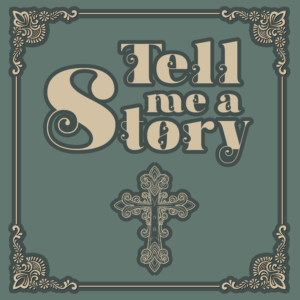Is life a comedy or a tragedy? Are we the hero or the victim? Or maybe the villain? Is the world descending into chaos and dystopia or are we on a path of ever-increasing prosperity and progress? The stories we tell orient us to our place in the world and our role in the story.
The Bible tells the story of a loving God and a messy people. There is a beginning and an end. Major themes of creation, redemption, and sanctification trace the arc of this grand narrative. And Jesus Christ is the center of it all – the great hero of the story who comes incognito to rescue and redeem his broken creation.

Invocation
In the name of the Father, and of the Son, and of the Holy Spirit. Amen.
Invitation
Lord Jesus, you once came to humanity in a rustic barn and a messy manger. Do not be distant from the rough places of our lives. We often find ourselves far from you. In mercy, come near to us, our Lord, Emmanuel; for you live and reign with the Father and the Holy Spirit, one God, now and forever. Amen.
Confession
Forgive my sins, O Lord – forgive me the sins of my present and the sins of my past, the sins of my soul and the sins of my body; the sins which I have done to please myself, and the sins which I have done to please others. Forgive me my wasted and idle sins, forgive me my serious and deliberate sins, forgive me those sins which I know and those sins which I know not, the sins which I have labored so to hide from others that I have hid them from my own memory. Forgive them, O Lord, forgive them all.
Word: Ruth 2:8-10
“Then Boaz said to Ruth, ‘Now, listen, my daughter, do not go to glean in another field or leave this one, but keep close to my young women. Let your eyes be on the field that they are reaping, and go after them. Have I not charged the young men not to touch you? And when you are thirsty, go to the vessels and drink what the young men have drawn.’ Then she fell on her face, bowing to the ground, and said to him, ‘Why have I found favor in your eyes, that you should take notice of me, since I am a foreigner?’”
Meditation: Love as Extraordinary Compassion by Megan Roegner
Ruth is not the only person in this story who has something to teach us about love. Boaz, too, provides an example. If Ruth shows us love as radical courage, Boaz shows us love as radical compassion.
If we read between the lines we can infer a great deal about Boaz: He is older than Ruth; he is relatively wealthy; he is respected in his community. Boaz, it seems, has a great deal of social power. And unlike so many other powerful people in his world and in ours, Boaz uses his influence to help people who are less privileged than him.
Boaz truly sees Ruth, and we know this because he understands the dangers that surround her. Her gender, nationality, and socioeconomic status put her at risk of violence and hunger. Now, the act of “gleaning” itself was a social safety net for impoverished people. Boaz could have shrugged his shoulders and assured himself that he was doing his part by allowing Ruth to glean in his field at all. But instead, he makes sure that she is protected and that she is nourished. Later in chapter two, Boaz invites her to share his meal with him. He also instructs his workers to provide grain from the gathered sheaves for her to take home. And even beyond this, he clearly communicates to Ruth that his actions are not motivated by pity but by respect for her, a woman that society would have seen as his inferior. To Ruth’s question about why she has found favor in his eyes, he says, ““All that you have done for your mother-in-law since the death of your husband has been fully told to me, and how you left your father and mother and your native land and came to a people that you did not know before. The Lord repay you for what you have done, and a full reward be given you by the Lord, the God of Israel, under whose wings you have come to take refuge!” (Ruth 2:11).
When I first really paid attention to the story of Ruth as an adolescent, I imagined a romance unfolding in these moments. Perhaps Ruth and Boaz’s eyes meet over a sheaf of barley and it is love at first sight. It’s a swoon-worthy thought. But the story is perhaps more powerful if we also take the time to understand Boaz not as a lovestruck fool but as a person who uses his social capital to help the less fortunate and to do so while granting them dignity and respect. Because as much as I would like to see myself as Ruth—brave and beautiful in the face of danger—as a white, middle-class American, I might have more in common with Boaz: a person with a great deal of social and financial security at my disposal.
With Boaz as an example, I can ask myself uncomfortable questions. Do I truly see the people in need around me? Do I honor our shared humanity and love all people as fellow children of God?
Heavenly Father, help me be so secure in the love and the blessings that you have provided me with that I can love my neighbor with radical compassion. Help me always remember that my neighbors are not just those who look, talk, and think like me. Amen.
Benediction
And the peace of God, which surpasses all understanding, will guard your hearts and your minds in Christ Jesus. (Phil. 4:7)
